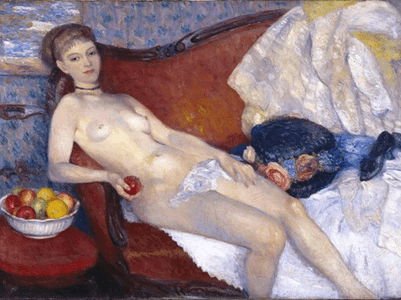
“Nude with Apples” by William James Glacken, an American realist painter. Oil on canvas, Impressionist style. Painted in 1910.
All the elements, principles, and composition dynamics make this painting feel alive and exciting, even though everything is static or calm. Her slim outstretched reclining body is composed and still. Bright coloured fruits, light and dark contrasts as well as colour contrasts and a mass of crumpled, discarded clothes adds to the dynamics as the eye flicks across and around the picture plane.
Although based upon and referencing Manet’s “Olympia” This painting lacks the gritty shock value to the same extent. In 1856 Manet shocked French society with Olympia, its scandalous subject and even greater scandalous paintwork outraging the Academy and polite society. This painting by an American artist painted 54 years later most likely still had some shock value. The coy covering of the sex almost feels like an afterthought to appease a more prudish American audience but it works well. William Glacken painted in Paris and soaked up Impressionism following closely the style and colouring of Renoir for which he was widely criticised.
A slender younger woman reclines on a sofa propped up on the left-hand side of the sofa, her legs, one bent at the knee, the other extending outward. One arm extends outward and rests on her thigh holding some material that may be a part of the dress she sits upon. This piece of material extends to cover her sex. Her other arm bent at the elbow rests on the sofa’s arm and she holds a red apple.
Her short hair is held in place by a hair band. Around her neck is a black choker, seen as a symbol of a prostitute or submissiveness. On the right, the dress and clothing cover the rest of the seat and the sofa’s back, the rest is cropped by the edge of the painting. Upon the clothing rests a brimmed hat decorated with flowers and a mid-high heeled shoe sporting a bow. On the left is a carved wooden chair with an upholstered seat on which stands a white ceramic bowl filled with the fruit of different colours. Above the chair is a framed painting depicting a woman standing on the shore of a body of water. The chair and sofa are upholstered, the chair has fretwork and the sofa has a carved wood trim, a part of a matching set.
The painting is a rectangular landscape orientation. The main figure cuts diagonally through the picture starting top left from the head, through the body down the extended leg to the right corner. The image is close-cropped with her feet missing. Close cropping of this nature was typical of Impressionist paintings derived from influences from Japanese art. Cutting through the figure, starting bottom left we have a second, opposite diagonal starting with the bowl of fruit, rising slightly following a line from the fruit to the offered apple in hand, to the sex-covering cloth and hand continuing through the flower line of the hat to the blue shoe far right. This strong dynamic creates a crossover point focusing on the viewer and highlighting the covered sex at this pivotal point.
This diagonal is the stronger line and has a lively dynamic with the busy coloured fruits the bright red apple held in the hand and picking up the pinks and reds of the hat’s trim. Another dynamic is the snaking curving line of the sofa’s wood trim which connects to the woman’s fringe, highlighting her face as does the thin black choker and continues down through the arm to end and focus on the offered apple again. The hidden corner of the picture frame also focuses our attention on her face as does the thin black choker.
The light flesh tones contrast with the darker reds and touches of the orange colour of the sofa. These flesh tones echo and harmonise with the light colours of the discarded clothing. Her body with touches of blue picks up the bold dark blues of the hat, shoes and wallpaper patterns as well as the hints of blue in the mass of clothing. There is a left-hand side stop of the painting with ladder-like striations moving up from the dark bottom band, front of the seat edge up to the bowl and a line of fruits picking up the middle and top slats of the chair and continuing with the picture frame, waters edge and water lines.
A slim young nude woman seductively reclines across the corner of a plush upholstered deep red sofa with carved wood trim. Her hair is combed back and fixed with a headband exposing her alluring fresh face. Her manner is relaxed and casual. She displays and offers her body for viewing with confidence. Her sex is coyly covered but this draws the eye into the very spot heightening the erotic charge and desire. Is this a deliberate tease or a caution on behalf of the artist for his expected audience?
She holds a deep red apple which pulls our attention to her breasts, fruits of another kind on offer. She looks directly towards us, the viewer, fixing our gaze. We can feel the sensation of standing before an offered body for sexual pleasure, an erotically charged scene, processing our own thoughts objections and desires that may attack our religious beliefs or accepted morality or feed natural pleasurable consensual desires and acts.
Her thin black choker gives a clue to her profession but she is not a common prostitute nor a poor street worker or a destitute victim of the cruelties that society can inflict upon the downtrodden and dispossessed. This is a higher class, a courtesan.
She attracts a wealthier clientele and a degree of respect. She has some control and choice in the matter of accepting or rejecting a client. She has the trappings of a higher class and lifestyle. She has quality fine fashionable attire, hats, elegant shoes, chic furnishings a matching chair and a sofa with hand-carved woodwork and trim. There are patterned wall coverings and a painting hanging on the wall. She has a fashionable ceramic and a tempting bowl of fruit to offer, one of which she offers to her client with an enticing look.
There is a clear suggestion of a double meaning, evoking the biblical story of Adam and Eve, forbidden fruit, a serpent and expulsion from the Garden of Eden. The courtesan is here enticing her male client with an offer of an apple and sexual congress to which he succumbs and when the act is done, she will be seen as the deceiver and perpetrator, the wrongdoer. She will be shamed, blamed and vilified and he will be the blustering indignant victim protesting his innocents with his reputation intact.
The painting on the wall depicts a lone woman on the shore looking out across an expanse of water, perhaps her desire for complete freedom and an escape from her situation, men and society. I doubt a life of a courtesan would protect her fully from the less desirable traits of men. Any concepts of Liberty, Equality and Fraternity even for French progressivism would rarely include women.
Recommend0 recommendationsPublished in Art History, Artists, Artworks, Student Research





Responses